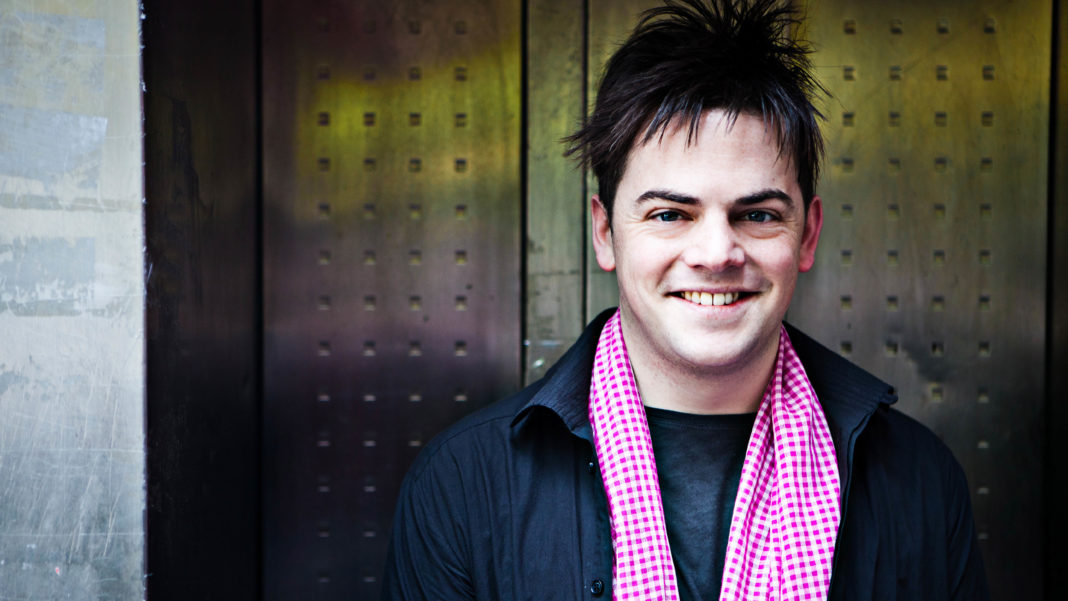If you think the idea of an organ concerto is as unlikely as combining the words “President” and “Trump,” you’d be mistaken. For centuries composers have tackled the concept of combining an orchestra with the mighty power of an organ. What is certainly different for contemporary composers (as opposed to someone like Handel for instance) is that our understanding of harmonics is different plus the greater number of instruments and size of orchestras is much bigger today.
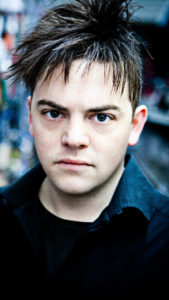
Enter composer Nico Muhly. Some may know him for his operas (Two Boys and Dark Sisters ); others might know him for his film scores (Joshua, The Reader ); still others might know him for collaborations with popular artists (Sufjan Stevens, Grizzly Bear.)
What you might not know is that he has composed quite a lot of work for the organ. So when the Los Angeles Philharmonic commissioned him to write a concerto for the massive pipe organ at Walt Disney Concert Hall, it didn’t come as a surprise to the 36-year-old composer.
I spoke with Muhly about the world premiere of Register (which has its official world premiere on Friday with two additional performances over the weekend) the day before the first rehearsal of his new work.
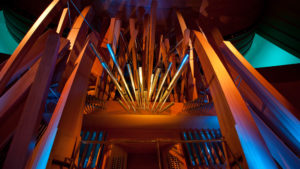
What familiarity did you have with the organ at Walt Disney Concert Hall before writing Register?
I’ve played it myself. I wrote a piece with LA Dance Project for clarinet, violin and that organ. I made a recording on that organ. The Los Angeles Master Chorale did a disc of my chorale music with that organ. I know it well and like it a great deal. It’s tuned so well to the space and fills it without dominating it.
What are the challenges of writing a concerto for organ and orchestra?
Something like a concerto is different than a choral setting in a church. A concerto has to leave room for the orchestra to come in. I wanted to take advantage of the LA Philharmonic. The organ and orchestra are tightly paired. In lot of cases the organ is playing and the winds are doubling at the octave and the third. Things are tightly integrated. It was obviously about the organ, but I’m writing a concerto, not a solo. The scariest thing is the latency between when you press the key and when the sound hits.
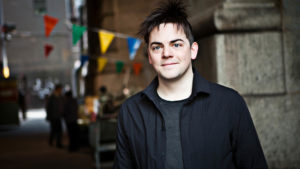
Thematically is there something you are hoping to get across with this piece?
What I wanted to do was write a piece that takes advantage of the modern organ and modern orchestra, but it always looking back at the instrument. It was important that buried in the DNA of this was something old. That’s at the heart of all my music. We exist in a modern space, but one of the things composers can do is look all the way back and articulate a kind of heritage that’s musical.
I wish I had some grand statement to make about geo-politics. I always resist making my music overtly political because I think writing classical music is overtly political and it can be hard. I was writing an opera the day after the 2016 election and that was hard. The work can be important. That Los Angeles is proud of their orchestra and all these things are obliquely political.
What, if any, revisions do you do to a piece in the days leading up to its premiere?
We’ll hear it for the first time tomorrow morning with the orchestra. At that time I’ll think I have to change everything. Then I’ll sleep on it and Thursday I’ll find a couple things I want to fine tune. On Friday at dress rehearsal I’ll watch the performance without the score. I really do think about it architecturally in that sense that if you have just moved one thing in your house, you realize it was the one thing messing up the house. I’ll make small amendments. I can tell already I’ll adjust some of the tempi. One of the things I’m doing this week is going through Marnie [his latest opera] and trimming out. I’m doing tiny pruning. It feels insane to do it and it makes my copyist crazy. The moral is I’m not too crazy to refuse to make revisions.
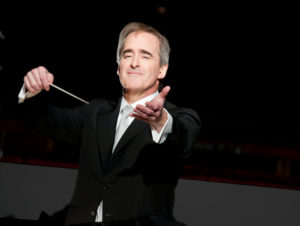
LA Opera conductor James Conlon is conducting these performances. Have you had any discussions with LA Opera about having one or more of your operas performed here?
I wish. I would love for one of those pieces to come here. It would be so fabulous. I’m a little shy. It wouldn’t occur to me to slip a score under the maestro’s door. I am here to really make this piece work. And I want to focus on that. I would love these operas to be heard all over the place.
Opera is the slowest moving ship in the ocean. It’s going to take time. When you write an opera, it stops belonging necessarily to you. I feel like what you need for an opera to have legs is to write roles that people want to be in. And orchestral music that the conductor is interested in. And a story the community wants to hear.
Your world premiere this week is sandwiched between a work by Ravel (Le Tombeau de Couperin) and Mussorgsky (Pictures at an Exhibition.) What are your thoughts on pairing better-known pieces with new work?
I think it’s hilarious. It’s funny. What’s even crazier is on Friday it’s just the Concerto and Pictures. I don’t think I’ve heard Pictures live in a decade.
The good thing about the programming and the best compliments I’ve ever gotten from audience members is “we normally don’t like contemporary music and we were nervous about your piece. And we loved it!” I hope the idea is that with something like Pictures, an old chestnut, you can see it in a different light when juxtaposed with something contemporary. I’d like to think it’s more playful. I always firmly resist the idea that programmers are treating the new work as the brussels sports at Thanksgiving dinner.











